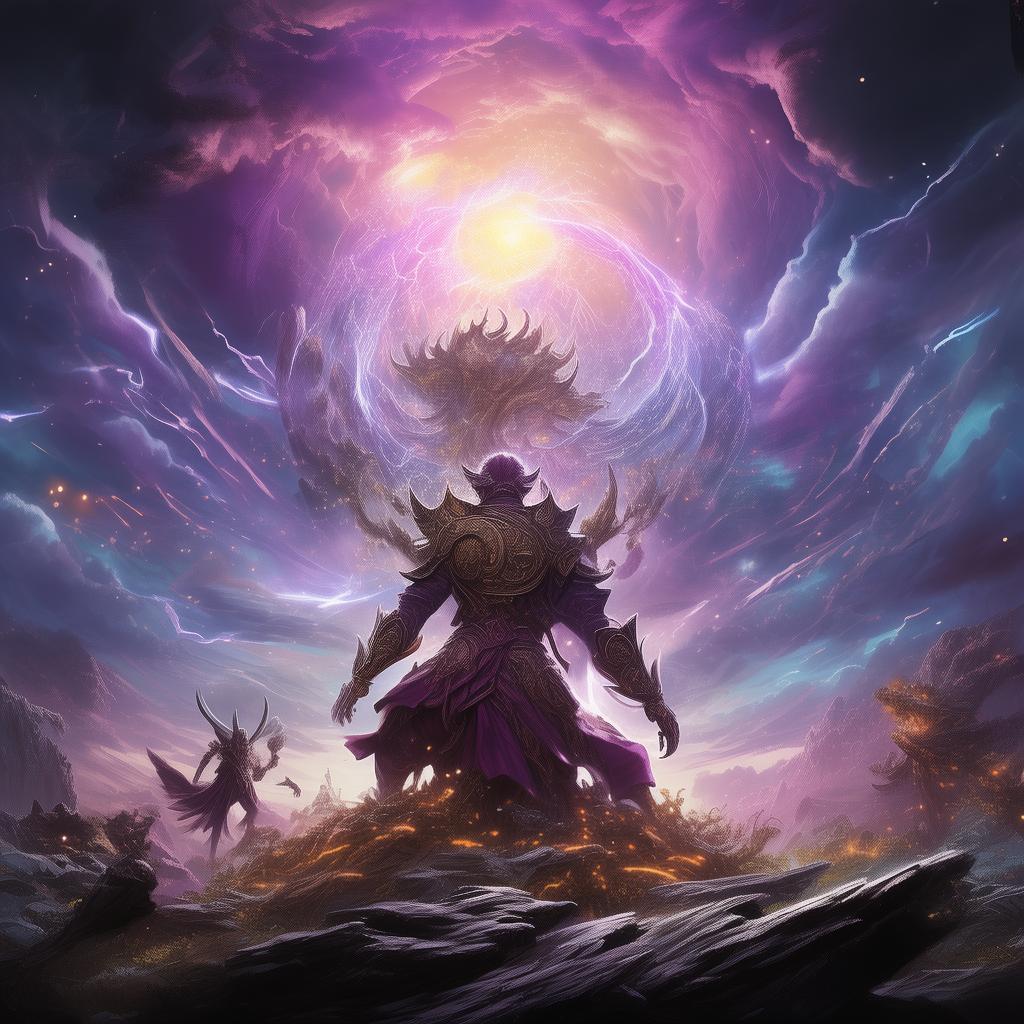Whispers of the Celestial Throne
In the heart of the Tang Dynasty, where emperors ruled with the grace of celestial deities and magicians wielded power like the gods themselves, there lived a young nobleman named Li Qing. His eyes were as clear as the morning sky, and his spirit as pure as the snowcapped mountains. His destiny was to ascend the celestial throne, a destiny that seemed as certain as the rising sun.
Li Qing's journey began in the grand palace of Chang'an, where he was presented with the celestial scepter, a symbol of his right to rule. Yet, as he stood in the vast hall, his heart was heavy with the weight of a legacy that was not his to claim. He was the adopted son of the former emperor, a nobleman without blood ties to the throne, but with a destiny that was as inescapable as the tide.
One night, as the moon hung like a silver coin in the sky, a dragon, ancient and wise, appeared before Li Qing. It spoke in riddles, its voice like the rustling of leaves in the wind. The dragon's legacy was intertwined with Li Qing's own, and it spoke of a quest that would take him far from the comfort of his noble home.
The dragon's first test was a trial of courage. Li Qing was sent to a remote mountain where he would face a demon, a beast of dark magic and malevolence. With a heart full of determination and a mind clear of fear, Li Qing ventured into the unknown. The mountain was a labyrinth of shadows and whispers, and the demon, a beast of terrifying proportions, awaited him at the heart of the labyrinth.
The battle was fierce, and Li Qing fought with all his might. His sword, forged by the celestial fire, danced in the air like a phoenix. The demon's roar echoed through the caverns, but Li Qing's resolve was unyielding. With a final, powerful strike, he banished the demon, proving his worth.

The dragon's next test was a trial of wisdom. Li Qing was taken to the heart of the Forbidden City, where he was to decipher a riddle that had plagued the imperial court for generations. The riddle was complex, filled with symbolism and hidden meanings, and Li Qing's mind raced as he struggled to unravel its secrets.
Just as he thought he had found the answer, he was confronted with a betrayal that shook him to his core. One of his closest advisors, a man he had trusted implicitly, revealed himself to be a spy, working for his greatest rival, the Prince of Jing. The prince sought to claim the celestial throne for himself and had manipulated Li Qing's advisors to undermine his authority.
Devastated and betrayed, Li Qing found himself in a web of treachery and deceit. The path to the celestial throne had become a treacherous path, and he realized that he had to rely on his own strength and wisdom to navigate it.
With the help of the dragon, who remained by his side, Li Qing began to unravel the true nature of his quest. The celestial throne was not merely a seat of power, but a symbol of the harmony between the heavens and the earth. Li Qing had to prove his worth not only as a warrior but as a leader who could bring peace and prosperity to his people.
As he journeyed through the land, Li Qing encountered allies and enemies alike. He learned the true power of magic, not just in its ability to bend the world to one's will, but in its ability to heal and inspire. He faced trials that tested his heart and his soul, and each time, he emerged stronger.
The climax of his journey came when he was forced to confront the Prince of Jing in a battle that would determine the fate of the kingdom. The prince, a cunning and ruthless leader, had amassed an army of dark sorcerers and demon warriors. Li Qing, with the dragon's guidance, gathered his own forces, a diverse group of warriors, scholars, and ordinary citizens who believed in the promise of a just and peaceful reign.
The battle was a spectacle of light and dark, magic and might. Li Qing fought with all his might, using the celestial scepter to harness the power of the heavens. The dragon soared above, its scales shimmering with the light of the sun, and the prince's forces were no match for the combined strength of Li Qing and his allies.
In the end, it was not the power of magic or the might of his army that secured Li Qing's victory, but the power of his heart. He forgave his betrayer, recognizing that even in the darkest of times, there is always hope. The prince of Jing, humbled by his defeat, agreed to step down, allowing Li Qing to ascend the celestial throne.
Li Qing, now Emperor Qing of the Tang Dynasty, ruled with wisdom and compassion. He brought peace to the land, and his reign was marked by prosperity and harmony. The legacy of the dragon was fulfilled, and Li Qing became a symbol of hope and strength for all who lived under his rule.
And so, the tale of Li Qing and the celestial throne became a legend, whispered through the ages, a story of destiny, betrayal, and the triumph of the human spirit.
✨ Original Statement ✨
All articles published on this website (including but not limited to text, images, videos, and other content) are original or authorized for reposting and are protected by relevant laws. Without the explicit written permission of this website, no individual or organization may copy, modify, repost, or use the content for commercial purposes.
If you need to quote or cooperate, please contact this site for authorization. We reserve the right to pursue legal responsibility for any unauthorized use.
Hereby declared.









